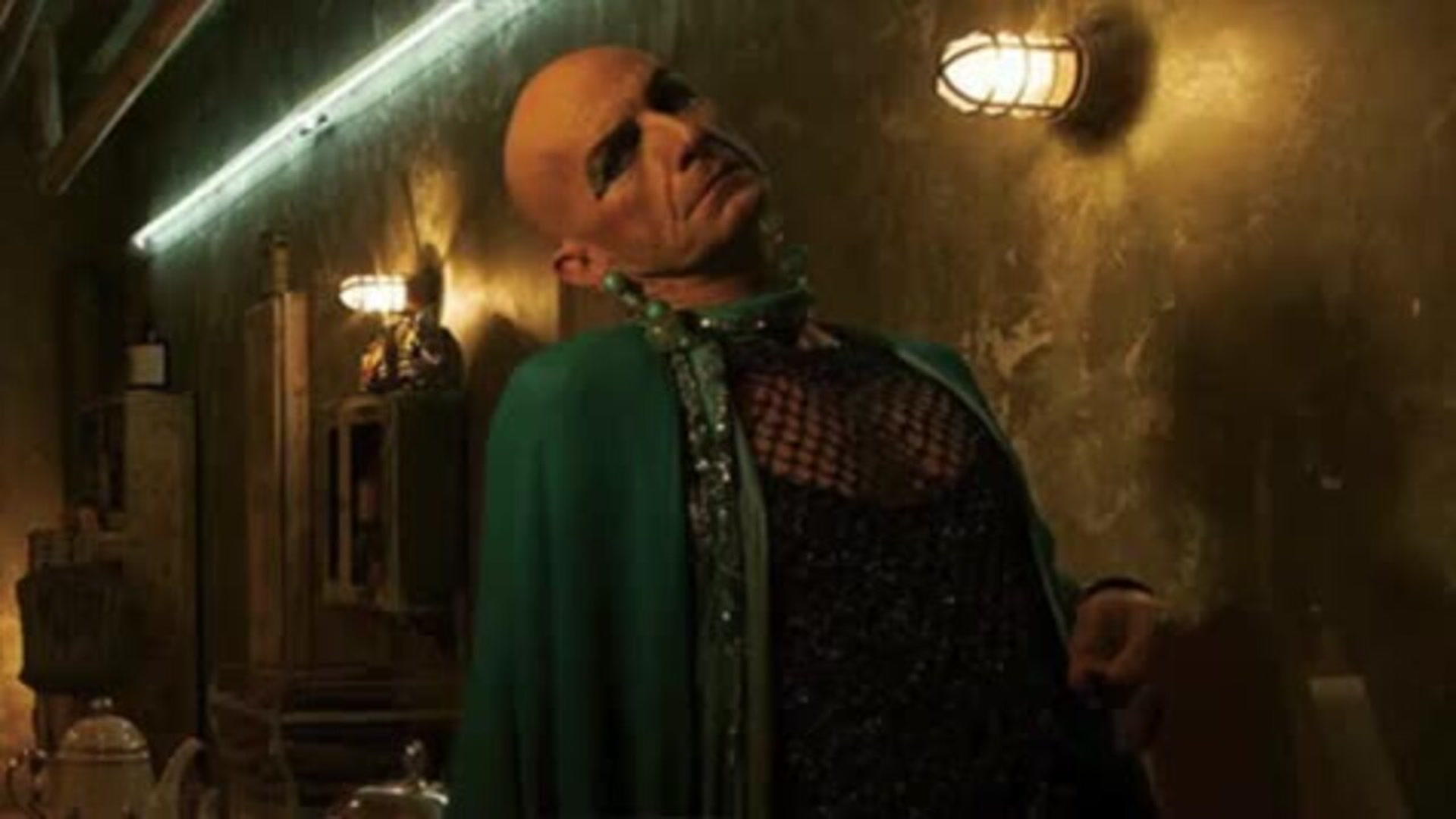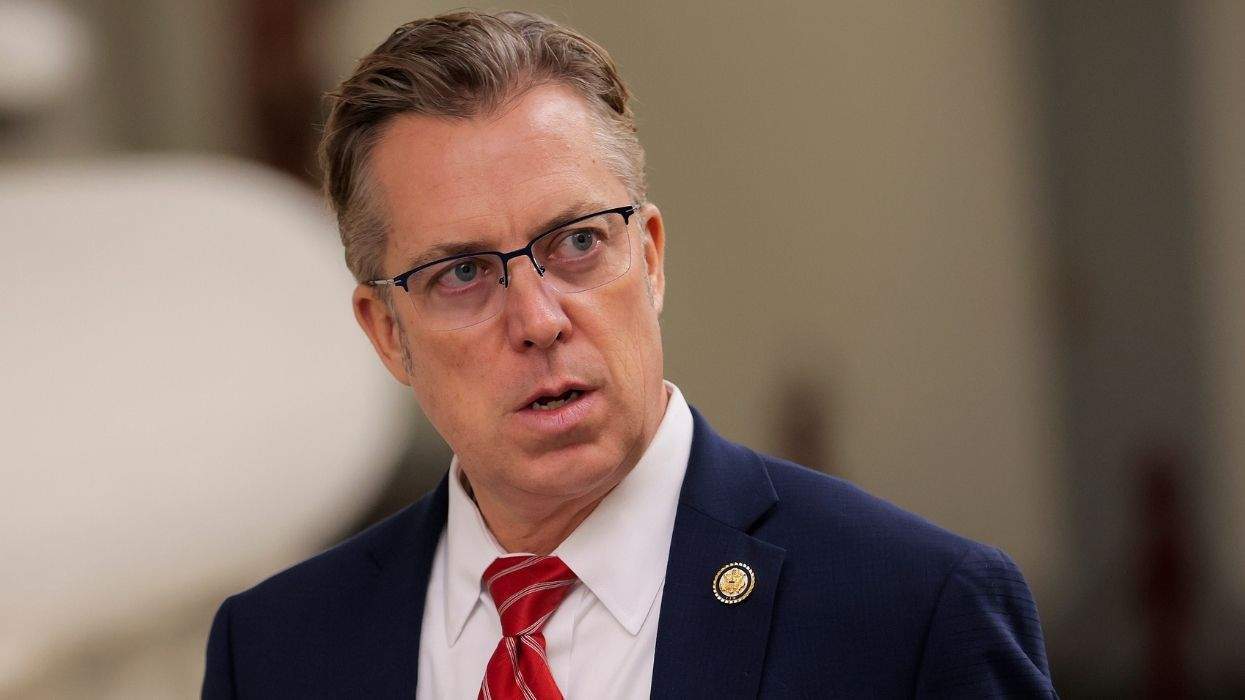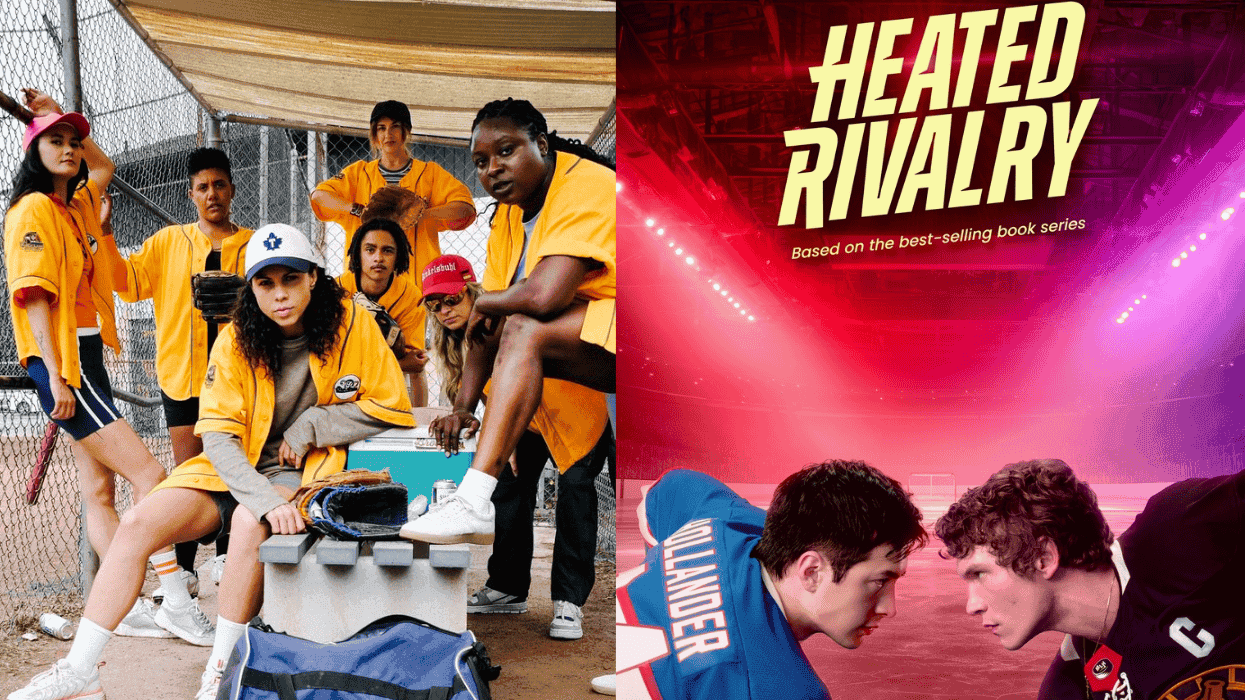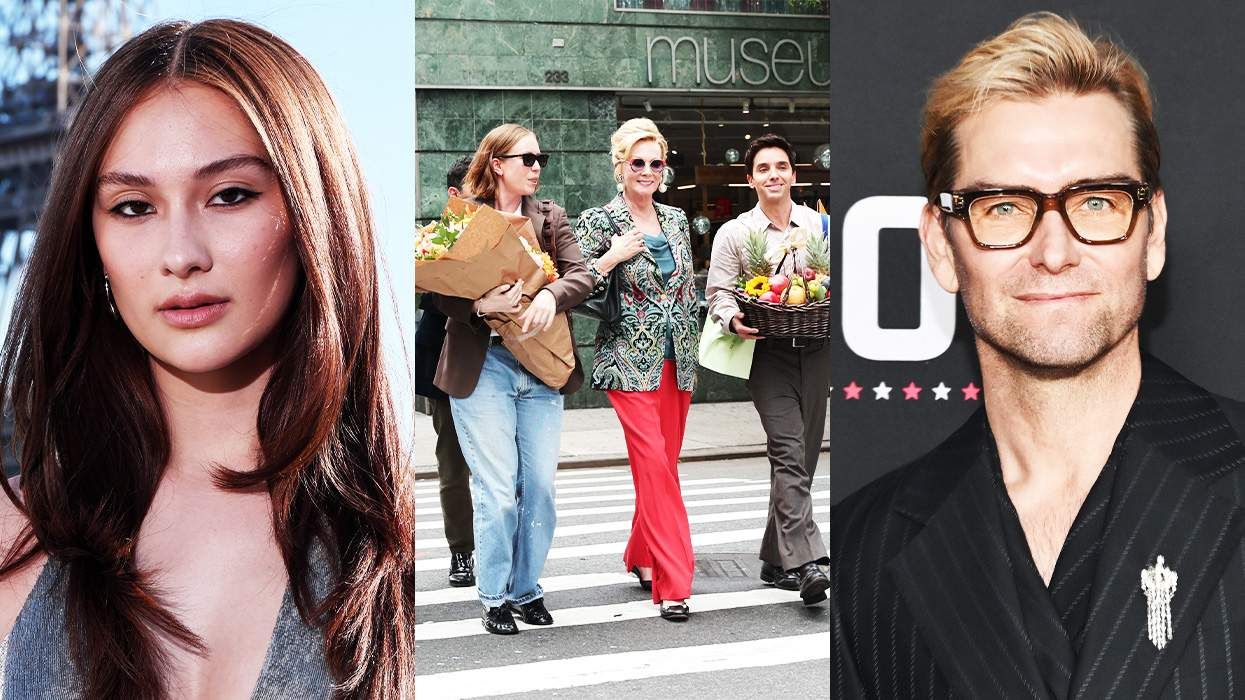After a long separation, a biracial female couple has passionate sex. Before his wedding, a man explains to his young son what it means to be bisexual. A transgender woman makes love to a cisgender man; later she reunites with her estranged son.
These are just a few of the gay, lesbian, bisexual, and transgender storylines present in this season of American Horror Story. Since its inception in 2011, the horror anthology, created by Ryan Murphy and Brad Falchuk, has established itself as one of the queerest shows on television. Characters of varying sexual orientations and gender identities occupy (or haunt) the show's milieus, including a murder house, an asylum, a freak show, a coven, and a hotel. It also boasts a host of out actors who inhabit these roles, among them Denis O'Hare, Zachary Quinto, Sarah Paulson, Matt Bomer, Cheyenne Jackson, Erika Ervin, and Lady Gaga.
And as the highest-rated show on FX, American Horror Story is an example of how LGBT diversity can be a valuable asset to networks. At PaleyFest, an annual festival celebrating television, The Advocate asked several of the show's actors to describe how the show succeeds at being different from others when it comes to LGBT representation and why that matters.
[RELATED: "Why American Horror Story: Hotel Is Booked With Queer Characters"]
Matt Bomer, an out actor, has played both straight roles, such as in Magic Mike, and gay roles, such as in HBO's The Normal Heart, which was also directed by Ryan Murphy. He first entered the AHS universe in Freak Show, in which he portrayed a sex worker who was murdered after cruising a gay bar. In Hotel he plays Donovan, a character who is in love with a woman, the Countess (Lady Gaga). But as evidenced in an early foursome scene, Donovan falls somewhere in the middle of the Kinsey Scale.
Contemplating the season's unique brand of queerness, Bomer credited gay cocreator Murphy for not only conjuring characters that span the sexuality spectrum but also for casting these roles with actors who were willing to either embrace or step outside of their own identities.
"I think it was so great what Ryan had going on this year, just with all different kinds of actors of all different walks of life, all different sexual orientations, playing all different types of roles," he said. "Straight, gay, it didn't really matter. It was sort of just like, 'You guys are actors. You can play any role no matter what.'"
As fashion designer Will Drake, Cheyenne Jackson also fell under the Countess's spell. This may have surprised many audience members, who witnessed him kissing one of his models, Tristan, portrayed by Finn Wittrock. But in a moving scene, Drake comes out to his young son -- and also AHS's millions of viewers -- as bisexual, and also explains the stigma many bi people face.
"I'm going to be blunt. Your father is bisexual. People think that word is dirty, but it's not. It means I like men and women equally," he said. "If you're lucky, once in your life you'll find someone who really understands you."
Before taking on this role, Jackson said, that he had a conversation with Murphy about the significance of having a bisexual male character on television -- a rarity, even in 2016. The erasure of bisexual people is a very real issue and can have disastrous consequences for not only representation, but also health and well-being of bi people. This ignorance not only plagues mainstream society, as Murphy discussed with Jackson, but also the gay community. He advised Jackson to prepare for a backlash.
"There is this whole sect of gay people who are like, 'No, bi is not a real thing. It's just a stopover until you're fully gay.' So it was interesting to embody" that character, Jackson said.
However, as a first-time actor in the anthology series, which often brings back actors in different roles, Jackson was given some words of wisdom from an AHS veteran. Sarah Paulson, a fellow out actor, told him the fans are "unlike any other" and "so committed and so intense in the best way." Jackson added that the approach to introducing these characters, along with the storylines they have, may be the reason American Horror Story and its diversity have been so successful in generating such passion and interest from viewers.
"It portrays every single type of person and every type of background without making fanfare about it. It just is," he said.
Liz Taylor, a transgender hotel employee played by gay actor Denis O'Hare, may have been one of the most quietly revolutionary characters on television in 2016. A plotline involving a touching reunion with her estranged son established her as the heart of the hotel. But it was her love scene with a cisgender man, Tristan, that may in fact have made broadcast TV history; only Transparent and Sense8, both shows streaming on Amazon, have shown this side of trans lives with such respect.
Reflecting on this love scene -- "a very, very complicated scene to play, but I really loved it," O'Hare said -- the actor spoke with reverence for Taylor and how she was written as a three-dimensional person who was much more than her coming-out story.
"With Liz, for instance, who is transgender, we didn't belabor the point. It's one part of her personality," said O'Hare, who has previously portrayed both queer (Freak Show) and straight (Murder House) characters in the American Horror Story universe.
"She doesn't have to be a saint," he continued. "She can be human -- flawed, imperfect, on a journey, and her journey was a very personal one. Where she was in the journey of her identity was private in many ways. We didn't spend a whole lot of time discussing it. I love that about it. It's a very respectful point of view."
This "respectful point of view" is the result of more than just casting. O'Hare pointed out that diversity begins on the other side of the camera.
"Having diverse creators helps," he said. "The more diversity occurs behind the scenes -- whether that means the showrunners or the producers or the studio heads -- the more you're gonna be able to have real diversity in front of the camera. Because the stories we can tell as people of color, as gay and lesbian people -- we have an authority, an authenticity we can bring to bear [that others can't]."
Authenticity is also more than just casting. Many shows and films incorporate LGBT characters, but their storylines are not always the most flattering or interesting or regularly featured. Even if its LGBT representation was not factored into the equation, American Horror Story would still be the queerest show on television by virtue of its perspective, aesthetic, and love of camp.
After all, would a show run exclusively by straight people burn a fashion-obsessed witch at the stake and have her last cry be "Balenciaga"? Or have a wooden-legged Jessica Lange sing David Bowie's "Life on Mars" on a freak-show stage? Or choreograph Lange and a group of mental patients to "The Name Game"? Or cast Lange in general? Perhaps not. Murphy's queer eye allows him to see what many others in the mainstream cannot, including beauty in the bizarre.
His eye extends to divas as well. Murphy has established a reputation of creating roles for actresses like Lange and Kathy Bates, who due to their age have faced discrimination in other parts of Hollywood. In Hotel he gave the bisexual singer Lady Gaga a vehicle to showcase her acting talent, which garnered her a Golden Globe win earlier this year.
It is also important to note that in American Horror Story, even the straight characters are queer. Each season centers on a group of individuals who, like LGBT people, are not "normal." Their conflicts are among themselves, but often they also grapple with greater society, which oppresses them for their otherness. When Queenie, a character played by Gabourey Sidibe in Coven who also makes an appearance in Hotel, tells a hotel employee played by Kathy Bates that witches are "born that way," she is not only giving a nod to Gaga. She is acknowledging that the characters in the AHS universe -- be they witches, mental patients, freaks, or vampiric beings -- are reflections of those in the real world who are fighting for their survival.
If a criticism could be aimed at American Horror Story: Hotel, it would be for its characters of color, or lack thereof. Angela Bassett, as the blaxploitation star turned bloodsucker Ramona Royale, stole many scenes. And there were memorable but brief appearances from Sidibe and Richard T. Jones. But the male eye candy -- Wittrock, Jackson, Bomer, and Wes Bentley -- looked suspiciously similar as white, broad-shouldered, and blue-eyed men.
In the PaleyFest panel, it was revealed that these similiaries were intentional. The show's central character, the Countess, had spent decades pursuing men who resembled her lost love, Rudolph Valentino. (The actor who portrays Valentino is Wittrock, who doubled as Tristan.)
Regardless, Murphy has recognized that there is much work that needs to be done when it comes to diversity in all its forms, and that change starts with his productions. "I personally can do better," he said in recent interview with The Hollywood Reporter. In February the TV guru announced that he would launch a foundation with his Fox production company, Half, in order to address his own shortcomings.
Murphy also made a resolution: By the end of 2016, half of the director positions on his shows -- American Horror Story, Scream Queens, and American Crime Story -- would be filled by women, LGBT people, and people of color. The foundation also plans to create a database of talent, which can be shared with other Hollywood power brokers seeking to give a platform to diverse voices.
"I think Ryan in general is generally about two steps ahead of the game for anybody," Bomer concluded. "So hopefully, they'll follow suit and just realize that anyone should get the chance to play any role regardless of who they are. And a part of creating a realistic world is having characters that are that diverse."
















Charlie Kirk DID say stoning gay people was the 'perfect law' — and these other heinous quotes
These are some of his worst comments about LGBTQ+ people made by Charlie Kirk.